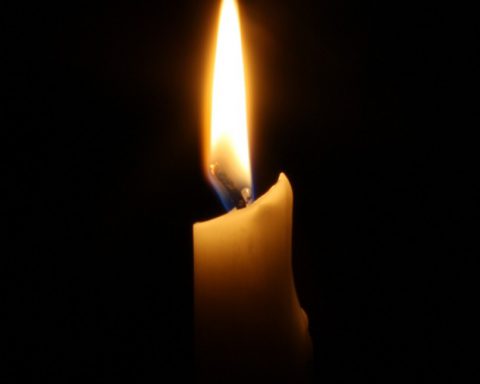Nationalism is a False Flag.
Editor’s Note: This sermon was preached on May 15, 2019, at the Presbyterian Church (U.S.A.)’s national office in Louisville, KY. It refers to Isaiah 58 as it appears in the NRSV. Although not originally a sermon for Memorial Day, it may be worthwhile to reconsider, too, the ways in which we commemorate the losses from terrible wars.
“Such fasting as you do today will not make your voice heard on high.”
When I first picked Isaiah 58 for today’s call to worship, I had planned to preach almost exclusively on the fights for justice that surround us: preventing increasingly ridiculous restrictions on women’s bodily autonomy, reuniting parents and children at the border, finally bringing relief to folks whose homes were destroyed in Puerto Rico, ending police and state brutality—you know the issues. In many cases, it is the explicit work of this building, of the PC(USA) as a whole, to try and work for justice on these issues.
I had planned to preach a message that identified the challenges ahead, celebrated the works of colleagues that I have grown to love over two years, and basically stop there. I was going to call for all of us to do more of the same. (I still mostly plan to preach that sermon). But I think that, first, we need to take a step back.
“Such fasting as you do today will not make your voice heard on high.”
Yes, Isaiah identifies the call for justice, but there’s some harder stuff to reckon with first. That call is juxtaposed against the “fake news” of a self-righteous nation. A nation focused on purity and doctrine—while ignoring injustice to sing its own praises—makes no progress.
Is it really possible to “remove the yoke from among us,” when the public narrative is one that War is Peace, that Ignorance is Strength?
Even though I’m invoking Orwell’s 1984 here, I’m really not talking just about Trump.
Here’s an example from much earlier: I grew up in a privileged suburban neighborhood–one where the schools were not shy about teaching all the “test-taking skills” that allowed their students to do better on standardized tests. One of those lessons stayed with me: In US History, we were told that whenever a multiple choice question had an answer including the word “nationalism”, that answer was almost certainly correct. What was left unsaid—for fear of being “too political”—was that that is a pretty scary condemnation of the United States, and not just of the overly predictable College Board.
Nationalism underpins nearly every lie spouted by Donald Trump. Nationalism underpins nearly every military conflict that the United States has undertaken long before Donald Trump. And nationalism saps the strength of protest against abusive power and replaces that energy with a lethargic sense of entitlement—a sense that we are immune from criticism. A sense that to speak out against policies reveals someone as an “enemy” or a “communist” or “un-American.”
Identifying the United States as “righteous” in this way blinds us to the reality of our collective sin—much as Isaiah writes that ancient Israel was blind to its injustice. When Jesus weeps for Jerusalem, the city that “stones the prophets”, he weeps as well for Washington, D.C as it harangues political opponents. Jesus weeps for Frankfort, KY as it makes services for the poor harder to access. And Jesus weeps for Louisville, as its homeless people are driven from the streets to accommodate military airshows and games of chance. As much as we enjoy Thunder Over Louisville and Derby, we should not be proud of them—of their impacts on the neediest in our city.
Even in this room, I think it would be a mistake for us to claim for ourselves the righteousness that our nation, our state, and our city consistently lack. I think that such a conviction would make us lazy—when, in fact, we have the knowledge and the power and the energy to change the narrative in each of these cases. Even justice-sympathetic folks often don’t take the risk.
Such fasting as you do today will not make your voice heard on high.
Isaiah identifies a fight for justice that happens at the level of national identity. That means that the fight takes place in the hearts and minds of individuals. So, when politicians talk their trope about “fighting for the soul of a nation,” I actually think that there’s something there. But what saving that national soul really means is learning, mind by mind, to have a more secure sense of self that is able to be open and compassionate.
I cherish the time I have been able to spend with the PMA. I have been impressed, and surprised, by the extent of the work which this church does to empower people to be their own agents of change. But I have been most impressed by the way in which the people in this building have been able to teach. I know I for one have been changed by the presence of so many mentors here, as you have been unafraid to hurdle differences of generation, identity, and calling to nurture my journey and accept me into yours.
And that is a vital process which I think Christianity as a whole has abdicated to its extreme wing in the public narrative. The never-ending work of building relationships one by one, building grassroots networks of understanding, caring people, building a collective understanding of ethics–that’s what we have to do.
We cannot afford to stand on the political sidelines any longer–because in the absence of critical and challenging voices, the default is self-righteous nationalism.
This comes with risks. Jerusalem stones the prophets! In the end, though, there is this: the call is made for the shackles to be broken, and we are promised that, if we act, healing shall spring up quickly.
Pray with me:
Dear God, in working to break the political and economic and cultural shackles that bind our siblings, your Children–help us to first break the shackles in our own minds that keep us separate from those siblings.
Help us to gain energy for your work, NOT from a sense of our own righteousness, but from the knowledge that your work moves us ever closer to justice.
May the power of your holy spirit lift us up, make us whole, and send us forth into the world–your healing voice.
Amen.
***
Author Bio: Henry Koenig Stone serves in Louisville, KY as current Managing Editor of Unbound and Associate for Young Adult Social Witness. Henry holds a B.A. in Economics (2015) from the University of Chicago and an MPP (2017) from UChicago’s Harris School of Public Policy.






Unbound Social